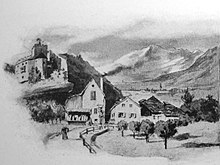Josef Jenewein
Josef Jenewein was an operator of Kleng establishments with steam and water operation , with headquarters in Innsbruck .
history
Towards the end of the 18th century, the commercial production and extraction of seeds that were used for sowing began to develop in Central Europe . At that time this was done in a very simple way: during autumn the cones were freshly picked from the trees or taken from the branches of the felled trunks and then dried in such a way that the cones were left on the stove during the day. In the home garden during the long winter, grain by grain was then pricked out of the pods with an awl .
As soon as the sack was filled with the selected grains, it was transported on foot on the trade route. Sales areas were the places where large trade fairs were held, such as Augsburg , Nuremberg , Leipzig and other markets. At these fairs the seeds were sold in small and large quantities. This type of harvest and sale did not bring much profit, but the seeds from the Tyrolean Alps traditionally had a good reputation and could hold their own against the competition.
The Jenewein company was founded in 1815. The company was designed like a factory, the workers, who had previously been scattered, were brought in centrally and permanent sales areas were created at home and abroad.
The so-called " Klengen " took place within larger rooms. The fruit cones of the forest trees were placed on so-called hordes in order to make them burst with simple heating devices. In buckets or drums they were tossed back and forth by water power until the seeds fell out of their own accord and, after cleaning with a sieve and hand mill, were produced as marketable goods on a large scale. In this way, an original housework had become a real business.
After the introduction of industrial forest management , demand and demand increased. Seed mills or "seed cycles" were set up in various valleys. The proximity to the source of the raw material had the advantage that the need for long haulage of the raw material and the resulting high costs were eliminated. The company had operations in Inzing in the Upper Inn Valley , in Forst near Meran, in Teser in the Fiemme Valley and in Sur En in Graubünden. The steam cycle was in the headquarters in Innsbruck, from where the technical and commercial management originated. By using steam power, the seed production industry had made great advances. They reduced the risk of fire, which was almost unavoidable when sizing, to a minimum and produced the largest possible amount of the product in a short time.
Jenewein had been awarded honorary diplomas , gold and silver medals, state prizes and recognition diplomas at numerous exhibitions and competitions . For its services it was appointed supplier to the Imperial and Royal Court .
Individual evidence
- ↑ Josef Jenewein . In: Presented by the industrialists of Austria under the high protectorate of His K. and K. Highness of the Most Serene Archduke Franz Ferdinand (Hrsg.): Die Groß-Industrie Oesterreichs . Festival ceremony for the glorious fiftieth anniversary of the reign of His Majesty the Emperor Franz Josef I. Volume 5 . Leopold Weiss, Vienna 1898, XII. Agricultural industry, food and beverages, p. 370-371 .




